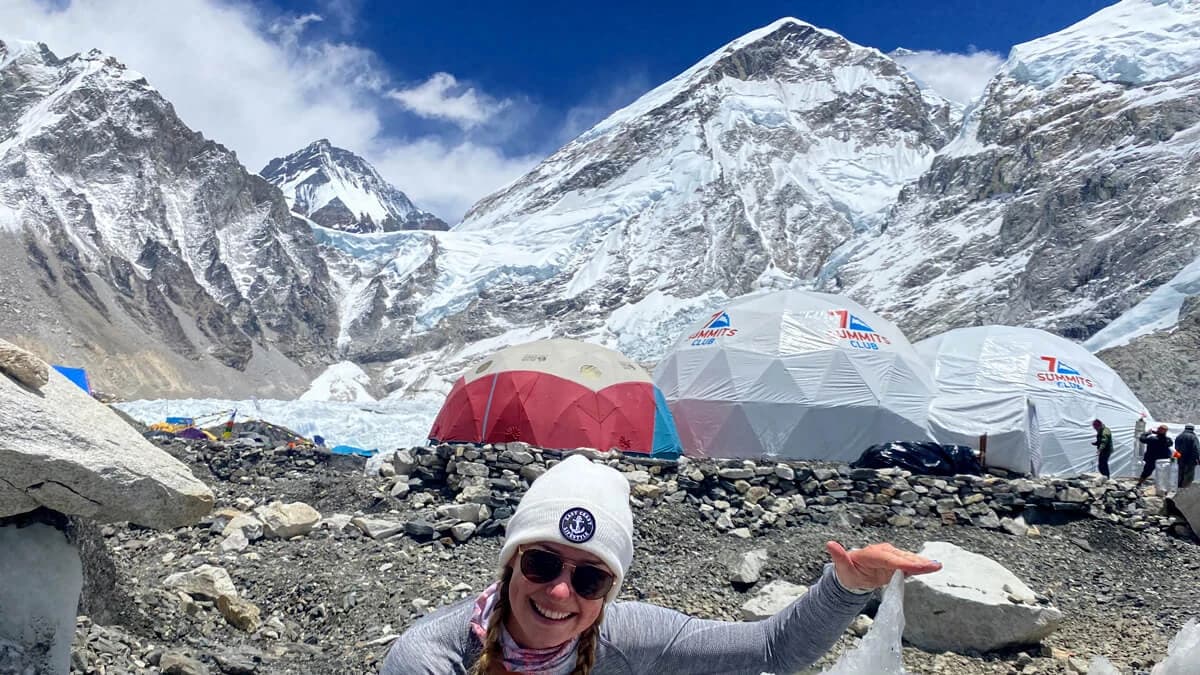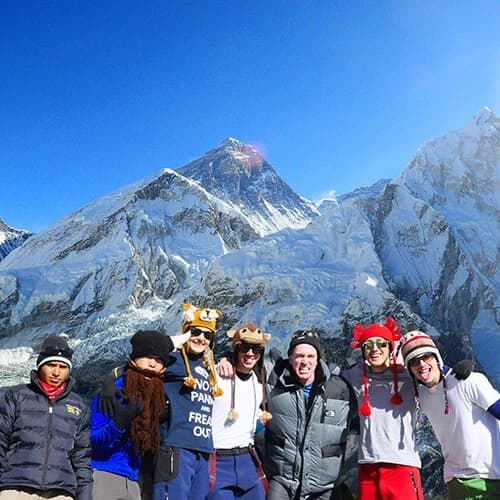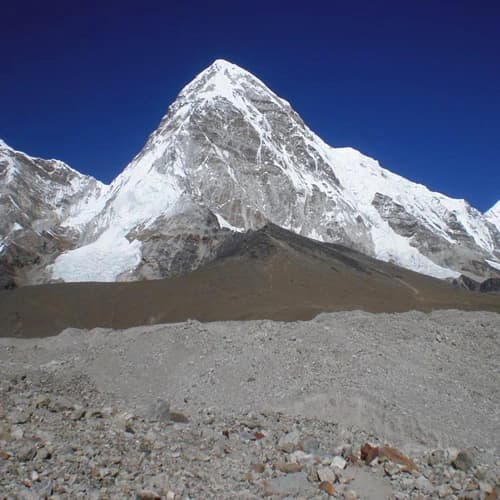The Everest Base Camp Trekking is perfect for nature enthusiasts and adventurers seeking a sense of accomplishment and spirituality. The trek teaches travelers the meaning of patience and determination. It is a once-in-a-lifetime adventure that offers spellbinding landscapes, fantastic wildlife, and the distinct Sherpa culture of the Everest region. The trail along the journey passes through raging rivers, narrow bridges, dense forests, and rugged terrains with a lot of ascent and descent, which makes the trek significantly difficult. One of the most notable challenges of the Everest Base Camp hike is the high altitude. As you hike up to higher elevations, the air in the atmosphere gets thinner, leading to reduced oxygen levels. As a result, this can lead to altitude sickness, which includes symptoms such as nausea, headache, fatigue, and dizziness. The 12 Days Everest Base Camp trekking is a tough challenge but is doable if you are prepared accordingly. Our blog breaks down the several elements and factors that make the trek challenging. This will help you assess yourself and take the necessary steps and precautions for a safe and enjoyable trek experience.
Everest Base Camp Trek Difficulty: What to Expect
How Difficult Is The Everest Base Camp Trek?
The EBC trek is moderate compared to other trek expeditions in Nepal, such as the Annapurna Circuit Trek or the Island Peak Trek. While some daring adventurers choose to summit Everest each year, others prefer to trek through the Everest region to the EBC. Over the years, people of all ages, shapes, and sizes have accomplished the trek easily and comfortably. So, with adequate preparation and determination, anyone willing to begin the trek can conquer the journey and tick it off their bucket list.
Everest Base Camp Tragedy
A 7.8 magnitude shook the nation on 25 April 2015, including the Everest region and surrounding countries. The tremors from the earthquake triggered several avalanches from Pumori into Base Camp, which caused the loss of several trekkers and mountaineers. Memorials have been built along the route in homage to the souls who lost their lives in the natural disaster.
What makes the Everest Base Camp trek difficult?
Several factors contribute to the difficulty level of the Everest Base Camp Trek, including rugged terrain, distance, altitude, limited facilities, and unpredictable weather conditions.
EBC Trek Distance
The Everest Base Camp trips covers a total distance of 130 km. Depending on the package you choose, you will be walking for 12-15 days in the expedition, covering a distance of 15km per day. The path you will be hiking on will be uneven and rugged, with paved trails on some parts of the trek. You will descend and ascend through the landscape, gaining elevation, making the hike challenging. Besides, although the ascent is gradual, it will require immense cardiovascular and leg strength to accomplish the hike. Moreover, carrying luggage and a daypack alone makes the journey significantly physically challenging. However, you can ease the burden on your body by hiring a porter or a mule along the trail.
Everest Base Camp Terrain
The Everest Base Camp hike takes you through various terrains across the Everest region. During the exciting journey, the trail passes through lush first of bamboo, pine, and rhododendrons. The expedition is a unique blend of landscapes unfolding higher as you descend on the trek. While the terrains along the way offer you unparalleled aesthetics, they also demand caution to avoid any risk of injuries. Moreover, as beautiful as the landscape you will be hiking on, the terrain is equally varied, ranging from rugged, rocky slopes to flat surfaces. So, you must be prepared with proper fitness levels, mental endurance, and gear to tackle the terrains of the Everest region.
High Altitude
Apart from the distance you will cover, the altitude gain makes the trek more difficult. The expedition begins after a scenic flight to Lukla, which is 2,860 meters (9,383 ft). The trail passes through several villages and landscapes before going up to Everest Base Camp, at 5,364 m (17,598 ft). The highest point of the Everest Base Camp trips is at Kala Patthar at 5,644 m (18,519 ft). It is one of the best vantage points of the region from where you can enjoy breathtaking views of the surrounding mountain peaks. The elevation gain throughout the trek can hurt your body. So, most packages feature two rest days, which allows our body to adapt to the atmospheric changes and the increasing elevation. These acclimatization days also allow you to explore the surrounding area and learn about the local culture and lifestyle.
Altitude sickness
As you enter landscapes over 2,500 meters, you will begin to experience the effects of less oxygen in the air around you. This can even lead to Acute Mountain Sickness, which includes symptoms like fatigue, dizziness, nausea, and shortness of breath. If you experience any of these symptoms, it should not be ignored, and you must inform the trek guide immediately. The elevation increases by 600-800 meters every day, so you will have to walk at a slow and gradual pace with an adequate amount of sleep and rest. Further, to avoid permanent altitude sickness, you must drink plenty of water and maintain a balanced diet throughout the trek.
Unpredictable Weather Conditions
Although the Everest Base Camp trip package is doable throughout the year, traveling without the weather and climate conditions can be challenging. Beginners trekkers might even be surprised by the changing temperature variation in the Everest region. During the day, the temperature reaches as high as 25 degrees, while it drops down to -10 degrees at night. Besides, you must be prepared for unpredictable weather changes in the trek, including downpours of rain and snowfall. So, pack the necessary gear and clothing to tackle the weather conditions of the season you are traveling. Always be prepared for unforeseeable events, as the weather in the Everest region is less predictable the higher you elevate.
Cleanliness and Personal Hygiene
Cleanliness is another factor that might cause discomfort to travelers during the Everest Base Camp. Maintaining your hygiene can be an issue, as you might have to go multiple days without a shower. The higher you ascend, the more difficult it will be for you to wash yourselves and your clothes. However, you can cleanse yourself with hot showers in tea houses at an additional charge. We also recommend you pack breathable clothing material as it's easier to wash and dry. Moreover, you must pack hand sanitizers, toilet rolls, tissue papers, wet tissues, and dry shampoos, which can help you maintain personal hygiene along the trail.
Limited Food Choices
The food choices during the Everest Base Camp are another factor you must consider if you have dietary restrictions. The menu items are pretty limited due to the remote nature of the places you will be traveling. You can expect food options like dal bhat tartar, bread, pasta, pancakes, momo, chowmein, and thukpa in tea houses. However, in places like Lukla and Namche, you will have various food and beverage options as the establishments are well-resourced and facilitated. Besides, we do not recommend you consume a high amount of meat products as most of them are stored, which can cause food poisoning or an upset stomach. It would help if you stuck to a vegetarian diet as they are fresh and locally grown. They will provide you with minerals and vitamins, replenishing your body after a long day of hiking.
Mental and Health Challenges
- Apart from the physical difficulties, one of the most challenging obstacles while undertaking the Everest Base Camp is outside our control. These include:
- Flight delay and cancellation to Lukla/Kathmandu due to unpredictable weather conditions.
- Halt during the trek due to illness or heavy rainfall and snowfall.
- Injury which causes you to abort the trek.
- Lack of preparation might lead to inconvenience during the trek.
- Developing severe mountain sickness and having to descend without completing the trek
Training Yourself
Completing Everest Base Camp is within the reach of individuals with a reasonable fitness level. We highly recommend you begin training 6-8 weeks before the scheduled trek. You must include exercise routines, such as aerobics, cycling, jogging, and swimming. This will help you significantly build your stamina, strength, and endurance. On the other hand, lightweight weight training can be beneficial as well. To be able to tackle the steep ascent and descent, you indulge in exercises that involve added weight.
Everest Base Camp Trek without Guide
Everest Base Camp Trek without a guide allows you to hike at your own pace and make changes according to your preferences. However, traveling without a guide might lack insights into the local history, culture, and geography. Similarly, the communication barrier with the locals will also affect the overall trek experience. Moreover, you will be responsible for your safety, and planning the accommodations and permits can be a hassle and time-consuming. So, we recommend you travel to the Everest region with a guide who will seamlessly provide logistics support. The guides are trained and well-experienced, so they can recognize and respond to the potential risks of AMS. Traveling with a guide will ensure a safe trek experience and offer an immersing cultural experience with the local communities.
Everest Base Camp Hiking Tips
- Here are some tips for a comfortable and enhanced trek experience at the Everest Base Camp.
- Carry essential medications and a first aid kit.
- Hydrate yourself to prevent early signs of altitude sickness.
- Avoid alcoholic drinks and excessive caffeine beverages.
- Wear sunglasses to protect yourself from the sun.
- Do not rush; rest adequately to acclimatize yourself to the increasing elevation.
- Pay respect to the local culture and traditions.
Some Most Popular Treks
- Everest Base Camp Trek - 14 Days
- 12 Days Everest Base Camp Trek
- Everest Base Camp Luxury - 14 Days
- Everest Cho La Pass - 17 Days
- Everest High Pass 16 - Days
- Annapurna Base Camp - 13 Days
- Ghorepani Poon Hill - 7 Days
- Annapurna Circuit - 17 Days
- 12 Days Annapurna Circuit Trek
- Manaslu Circuit - 14 Days
- Manaslu Trek 12 Days
- Everest Base Camp with Island Peak - 16 Days
- Everest Luxury Trek with Helicopter Return
- Langtang Valley - 10 Days




